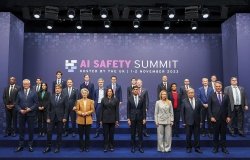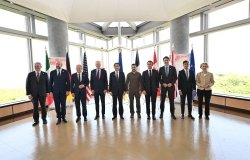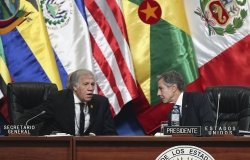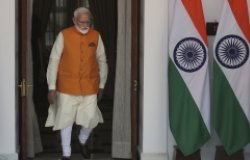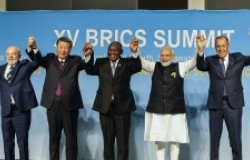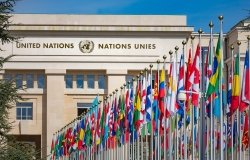Celebrity Diplomacy: Challenges and Opportunities
With a recent increase in celebrities drawing the world's attention to international issues such as poverty, debt eradication, and pandemic diseases, panelists explored how celebrities can most effectively use their fame as a means of adding credibility and attracting attention to global issues.
Overview
Over the last decade, celebrities have increasingly used their star power to help draw the world's attention to international issues such as poverty, debt eradication, and pandemic diseases. Yet, little discussion has taken place to examine whether the emergence of celebrity diplomats have had a beneficial impact in addressing some of the most challenging international issues of our time. On Tuesday, September 25, the Wilson Center's Canada Institute and Project on Leadership and Building State Capacity, in collaboration with the Centre for International Governance Innovation, hosted a panel discussion exploring how celebrities can most effectively use their fame as a means of adding credibility and attracting attention to global issues.
Identifying the Role of Celebrity Diplomats
Andrew Cooper, author of the recently published book, Celebrity Diplomacy, opened the discussion with a question: can celebrities be diplomats? Although celebrities have promoted causes in the past, the emergence of "celebrity diplomats," with their high-level access to political officials and ability to generate wide press coverage are a more recent phenomenon.
Cooper based his analysis of the potential role of celebrities in diplomacy on three criteria: global reach, interaction with high-level state actors, and a sense of purpose. Bono is emblematic of these criteria, noted Cooper, transcending the traditional boundary between the world of entertainment and public affairs. He noted that some public figures, such as Bob Geldof, have achieved success as an advocate, but have been far less successful in convincing public officials to take them seriously in a diplomatic role. In contrast, Bono is widely accepted and perceived as a statesman, successfully blending his star power with an exceptional degree of professionalism when promoting efforts to help eliminate poverty and HIV-AIDS in Africa.
Throughout his presentation, Cooper carefully distinguished between those he terms "glamorist enthusiasts"—celebrities who use their status to advocate certain causes on more of an ad hoc basis—and celebrities such as Bono, who have succeeded in generating greater attention to issues than, in many cases, even state leaders themselves. Bono uses his celebrity status to gain access to a variety of leaders. Bono has succeeded, Cooper explained, in mobilizing some politicians while at the same time alienating others, including Paul Martin and Stephen Harper— respectively, the former and current prime ministers of Canada— who distanced themselves from Bono after he unsuccessfully pressured each to increase their foreign aid commitments.
Despite varying degrees of success among celebrity diplomats, Cooper maintained that celebrity diplomacy is more than a passing fad; in fact, it represents a new category of networking, where the worlds of entertainment and material resources meet. This phenomenon, noted Cooper, which has not yet been addressed by international relations theorists, warrants further conceptual examination.
Exploring Celebrity Diplomacy in Practice
John Marks continued the discussion by describing how celebrity diplomacy is used by Search for Common Ground (SFCG)—a conflict resolution and prevention NGO committed to transforming conflict into cooperation action—as a tool to bring global attention to humanitarian issues and help foster conflict resolution.
In his presentation, Marks delineated three specific categories of celebrity diplomacy. First, Marks introduced what he termed "traditional celebrity diplomacy," presenting a video clip of a former child soldier in Sierra Leone speaking with Michael Douglas. Marks explained that SFCG included Douglas to draw international attention to the challenges that ex-combatants face during reintegration. Second, Marks identified "celebrity award diplomacy," which uses awards to bring attention to a certain category of people, such as peacemakers, in order to encourage others to participate in similar efforts. Finally, Marks labeled the third category "specialized celebrity diplomacy."
Marks presented a number of examples from this third category, including public service announcements featuring celebrities like Ziggy Marley; videos of Macedonian and Ethnic Albanian soccer team members working together to score goals; and a music video featuring well-known Israeli and Palestinian musicians promoting conflict resolution. Marks noted that the use of celebrities in public service announcements can serve as a powerful means of communicating messages of reconciliation and represents an approach of using popular culture as part of a strategy to change societal behavior.
During an active question and answer session, participants questioned the role of celebrity diplomacy in 21st century foreign policy and remarked on the potential complications and dangers of celebrity diplomats' escalating influence. As Abigail Friedman remarked, the deep, intractable problems and crises affecting today's world are optimally addressed by all tools and resources, of which celebrity diplomacy represents only one. Marks echoed Friedman's remark, emphasizing that celebrity diplomacy should only be used as one component of any strategy to raise awareness and focus societal attention on humanitarian issues and conflict resolution: "I don't pretend to [think of celebrity diplomacy] as a way of resolving problems on its own terms."
Hosted By

Canada Institute
The mission of the Wilson Center's Canada Institute is to raise the level of knowledge of Canada in the United States, particularly within the Washington, DC policy community. Research projects, initiatives, podcasts, and publications cover contemporary Canada, US-Canadian relations, North American political economy, and Canada's global role as it intersects with US national interests. Read more
Thank you for your interest in this event. Please send any feedback or questions to our Events staff.

